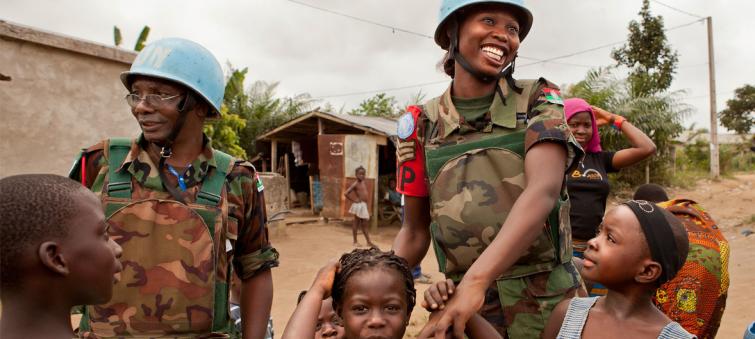
‘Real change’ involving women in peace and security, still too slow, Guterres tells Security Council
New York/IBNS: The Women Peace and Security agenda must continue to be “one of the top priorities of the United Nations”, Secretary-General António Guterres told the Security Council on Tuesday, in an open debate on how best to accelerate change.
He spoke of “the sad fact” that the commitment “reflected around this table is not translating into real change around the world”, lamenting, “it is not coming fast enough or far enough”.
“Change is coming at a pace that is too slow for the women and girls whose lives depend on it, and for the effectiveness of our efforts to maintain international peace and security”, the UN chief said.
Guterres informed the Security Council that nearly two decades since resolution 1325 acknowledged the disproportionate and unique impact of armed conflict on women and girls, “women still face exclusion from peace and political processes”.
“A pitifully small 0.2 per cent of bilateral aid to fragile and conflict-affected situations goes to women’s organizations”, bemoaned the UN chief, noting the rise of attacks against women human rights defenders, humanitarians and peacebuilders and the use of sexual and gender-based violence as a weapon of war.
Misogyny, a ‘strategic objective’
A growing number of armed groups use gender inequality as a strategic objective, with “misogyny part of their core ideology”, according to Mr. Guterres. “And, of course, we know that women and girls continue to pay the consequences of conflict in general”.
Turning his attention to northeast Syria, he pointed to thousands of women and children fleeing the latest violence, and vowed not to give up, calling it “an absolute priority” for him.
Guterres elaborated on UN actions to include women in processes, such as the UN-established Women’s Technical Advisory Group in Yemen, to ensure their perspectives.
To create lasting peace, we need women’s voices. From conflict prevention and conflict resolution to reconciliation and economic recovery post-conflict, women’s meaningful participation in peace...
UN departments are implementing a new, stronger policy on women, peace and security, he noted, while special political missions and envoys have been instructed to report regularly on their efforts to promote women’s “direct participation” throughout all stages of peace processes.
Moreover, peacekeeping operations are working to end sexual exploitation and abuse and increase women’s participation.
“Incidents of sexual exploitation and abuse have been reduced by half, and we are finally moving the needle on the percentage of women in the military and the police component of our operations”, flagged the UN chief.
Noting that he was pursuing “emergency measures to achieve gender balance”, Mr. Guterres pointed out that he has appointment many women as heads and deputy heads of missions and reminded the Chamber that – endorsed by more than 150 countries – “women, peace and security is one of the eight priority pillars of our Action for Peacekeeping”.
As such, he has requested peacekeeping and special political missions to improve their monitoring and reporting on threats and violence against activists, and for this to be built into early warning signs of escalating conflict or instability.
Guterres closed his statement by recognizing both the progress made and how much more remains to be done.
“When we fall short, women and girls and all members of society pay the consequences”, he said, noting the “enormous” cost of not acting on behalf of women’s rights.
‘Stark contrast’ between words and deeds
UN Women’s Executive Director Phumzile Mlambo-Ngcuka presented the Secretary-General’s latest WPS report in the Council, noting the “stark contrast” between offers of support and reality.
“We still live in a world that tolerates and excuses women’s continued exclusion from peace and political process and institutions”, she stated, pointing out that after conflict, men dominate large-scale reconstruction while economic recovery for women is overwhelmingly limited to small-scale activities like micro-enterprises.
“Feminist organization’s repeated calls for disarmament, arms control and shifting military spending to social investment go unanswered”, censured Mlambo-Ngcuka.
In remarking that several recent peace talks had largely excluded or sidelined women, she stated: “We can do better than this”.
“We need your political will to demand women’s direct and meaningful participation in peace talks”, Mlambo-Ngcuka stressed, observing that fewer than eight per cent of agreements reached, contained gender-related provisions –down from 39 per cent in 2015.
She cited a recent analysis on Colombia’s 2016 peace accord that showed around half of the 130 gender-related provisions in the agreement have not been initiated.
A new resolution
Before the meeting adjourned, the Council adopted resolution 2493, which, among other things, requested further information on the progress and setbacks in the WPS agenda as well as recommendations to address new and emerging challenges.
It called for the appointment of gender and/or women protection advisers to facilitate women's “full and effective participation and protection” in election preparation processes, disarmament, judicial reforms and wider post-conflict reconstruction processes.
The resolution also requested the Secretary-General to develop “context-specific approaches” for women's “full, equal and meaningful participation” in all UN-supported peace talks to ensure their inclusive involvement.
Photo caption and credit:
ONUCI/Patricia Esteve
Malawian peacekeepers serving with the United Nations Operation in Côte d’Ivoire (UNOCI) greet children while on patrol in August 2012.
Support Our Journalism
We cannot do without you.. your contribution supports unbiased journalism
IBNS is not driven by any ism- not wokeism, not racism, not skewed secularism, not hyper right-wing or left liberal ideals, nor by any hardline religious beliefs or hyper nationalism. We want to serve you good old objective news, as they are. We do not judge or preach. We let people decide for themselves. We only try to present factual and well-sourced news.







